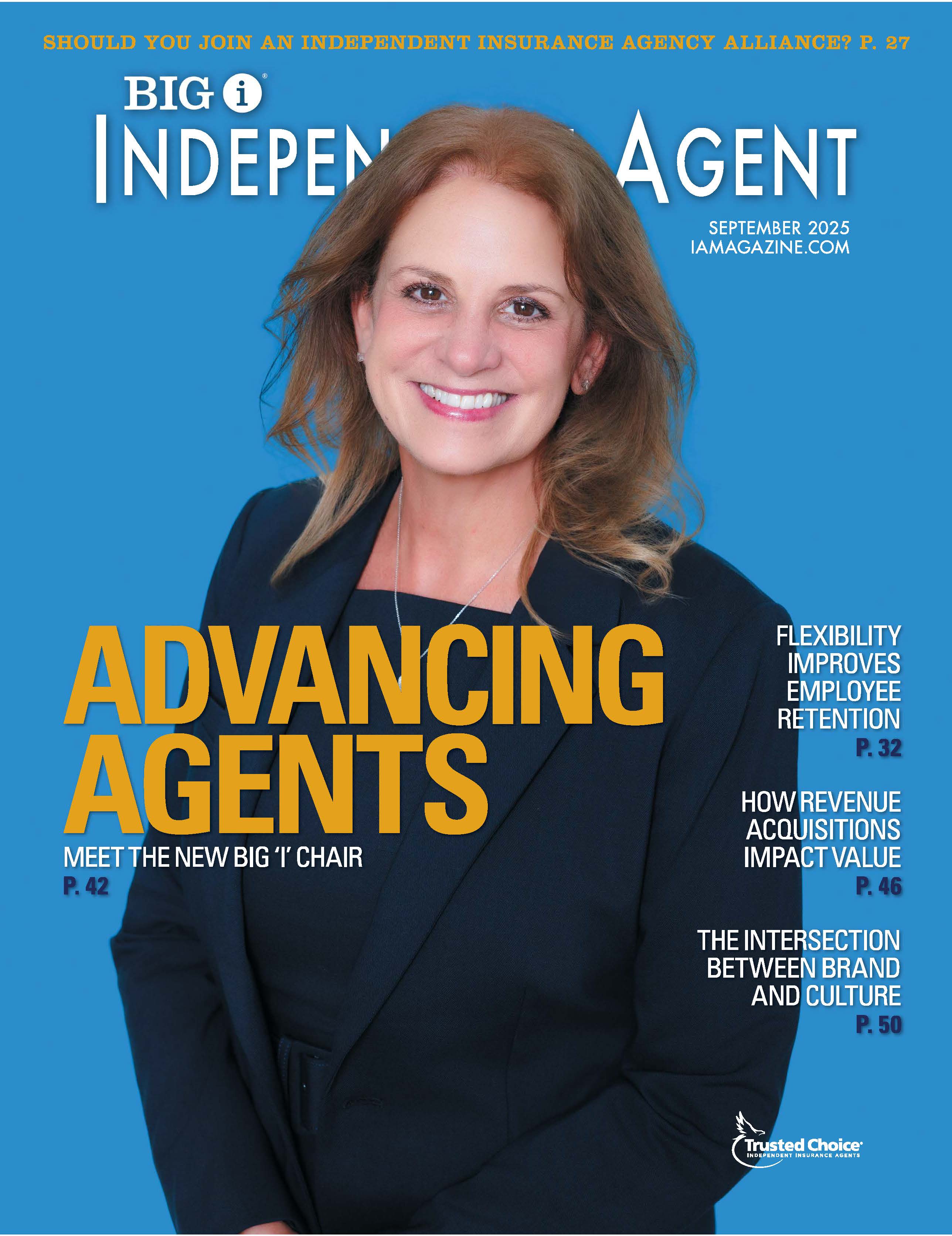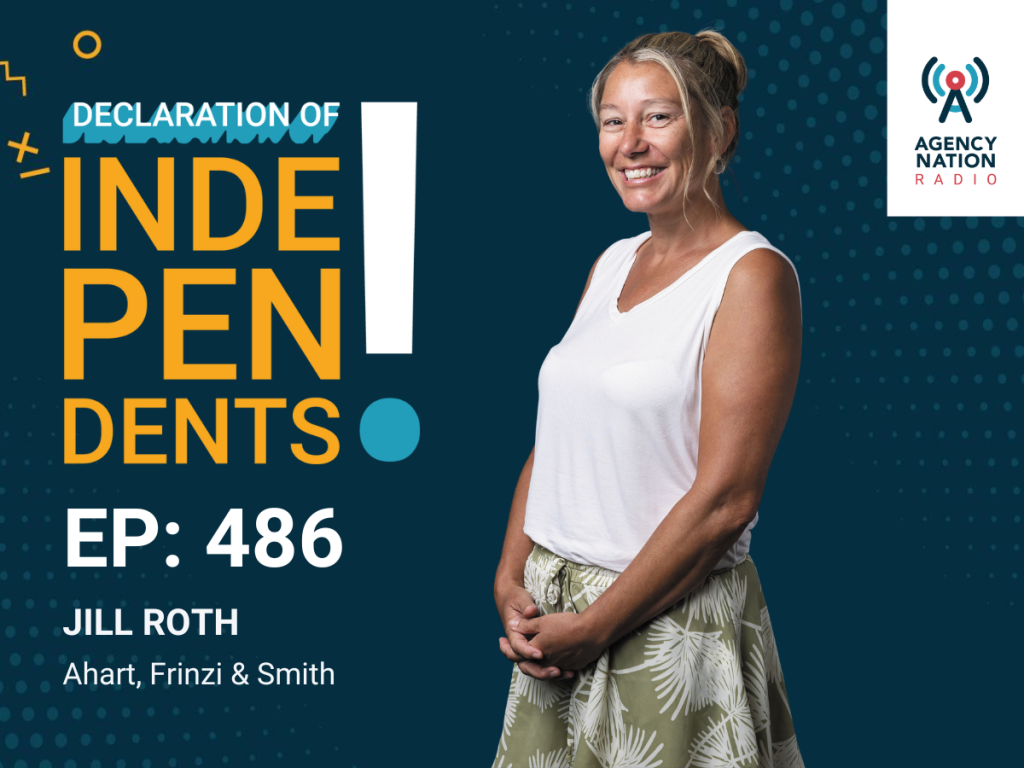12 Marketing Mistakes Agencies Make and How to Fix Them

Nearly every agency engages in some form of marketing activity, according to the 2024 Agency Universe Study, with utilizing social media and websites the most popular methods. Yet, marketing effectively on the internet was the second most common technology challenge among independent insurance agents, the study found, topped only by dealing with multiple carrier interfaces.
From building a brand to running paid social media ads, the world of marketing has significant nuances that agency staff miss as they concentrate on core activities like sales and service. Further, the limited amount of time and energy available to pour into marketing makes it all the more important for marketing undertakings to be effective.
Wise marketing investments are even more important for small agencies. While the average agency with a dedicated marketing budget puts 16% of all expenditures toward marketing, small agencies say their marketing budget represents 32%, or nearly a third, of their total expenditures, according to the Agency Universe Study. Only 4% of agencies do not have a marketing budget.
Here are 12 of the top mistakes that independent agencies make with their marketing—and how to fix them:
1) Failing to differentiate themselves from competitors. “There are so many benefits to being an independent agent compared to being captive,” says Chelsea Peterson, manager of marketing at BrightFire. “Agencies need to more effectively highlight their local customer service, access to multiple carriers and ability to easily compare options.”
When consumers don’t understand the benefits, they’re much more likely to be lured by commoditized, dirt-cheap, direct-to-consumer options. “The average consumer might not understand that independent agents have access to multiple carriers or that they’re local to their community and can offer more personalized customer service,” Peterson says.
“So many people still use the ‘best insurance at the best price,’ but that’s not who we are,” agrees Michael Barrett, co-owner and agent at Barrett Insurance Agency in St. Johnsbury, Vermont. In addition to the “best” terminology contributing to errors & omissions claims, it’s not even what a customer truly wants from an independent agency. “We are the agency that works to earn your trust and develops a relationship with you so you’re not left to your own devices when claims happen,” he says.
Agencies should highlight “the practical advantages of being independent on their blog posts, website, local business listings, social media channels and paid advertisements,” Peterson says.
2) Approaching marketing on a project basis. Agencies tend to concentrate on marketing when there’s a time-sensitive need, observes Larry Neilson, managing partner, Neilson Marketing Services. “A producer needs leads with pressure from a carrier, or they just hired a producer, so the agency decides to run a marketing campaign looking for prospects to call.”
“The reality is that most agencies have an 85%-90% retention rate, which means only 15% of the actual universe of prospects may be looking to move their insurance in any given year,” Neilson continues. “If you divide that by 12 months to accommodate renewal dates, it turns into a needle in a haystack.”
As a result, agencies rush to call all these prospects and, when nothing happens, “they decide to pull the plug on the marketing because it costs money,” he says. “The next year, they do the same thing with the same data.”
Instead, agency marketing should be conducted in an orderly, ongoing system. “Build a universe of prospects, get it into some format in email marketing automation software, and have a continuum of outreach to those prospects so that you can meet them when they are in the sales cycle,” Neilson says.
In some circumstances, marketing will necessitate urgency, such as pressure from a carrier on a minimum premium requirement, Neilson points out, but slapdash marketing should not be the norm.
More From IA Magazine
3) Having an inconsistent brand. “It’s all about understanding how we want to be perceived in the marketplace,” Barrett says. “We can’t be a unilateral advertising campaign. We have to be available, and we have to have consistent messages and branding across the board.”
Barrett points out that one of the best, basic versions of free marketing is “any listing site that’s out there—Google, Bing, Apple,” he says. “We ensured our listings across the internet were correct and up to date.”
The effort proved itself worthwhile because, when Barrett Insurance Agency moved to a new location, “our marketing was seamless because we were able to control all the details,” he says.
To help, Trusted Choice® released a Google Business Profile Optimization Guide. Download the guide to get started on building a consistent presence that boosts online visibility.
4) Not using content to establish a web presence. “A big missed opportunity is content,” Neilson says. “If an agency defaults to price and goes with a low-cost website provider, they may have a good-looking, modern website—but it’s missing key elements of search engine optimization (SEO) and ongoing content to help them establish search ranking, authority and reputation in the digital world.”
A website is a huge component of agency branding, which is where agencies should concentrate their marketing efforts first. “The best way to get the most mileage out of your website is by investing in a high-velocity SEO program,” he says, and recommends paying attention to Google My Business, creating a link-building strategy and adding to an ongoing content strategy, such as blogs.
The goal of the content strategy is to gain recognition for search keywords around the products an agency wants to market. “If you’re selling truck insurance, you want to be ranked on search engines for trucking,” Neilson says.
5) Overlooking your best marketing team. Shawn Fogle Principi, vice president at Fogle Insurance Group in Huntersville, North Carolina, assembled the agency’s marketing team from agents from each agency department—commercial lines, personal lines, and group health and life.
“Your own staff are already with you, they’re already committed—and the best marketing team is somebody who believes in you,” Principi says.
“Make sure you have different age ranges of people who can form a small team within your agency,” she adds. “You need the young and social media savvy, but you also need input from older agents.”
Each member of the Fogle Insurance marketing team is heavily involved in the community. “They get together regularly to discuss ideas to get our name out there,” Principi says. “They’ll go to chamber events, breakfast events, evening events—they find out what’s happening in the community and are constantly bouncing ideas off each other.”
The team’s biggest marketing success has come through social media posts inspired by something the marketing team all has in common: love for their pets. “The hot ticket item is animals,” Principi says, adding that it’s an opportunity she never would have thought of. “I don’t own pets,” she says. “I let them run with it.”
And run with it they did, as the team channeled their social media traction into an event. “Now, every year, we hold an event at a brewery and work with an animal rescue that puts out dogs for adoption on that day,” Principi says. “We collect pet supplies and donations to go toward the dogs being adopted. We get so many referrals from that event.”
6) Posting inconsistently on social media. Referrals are a strong strategy to bring in new leads and are the top method of keeping in touch with prospects for both personal lines and commercial lines, at 59% and 57% respectively, according to the 2024 Agency Universe Study. But maintaining a vibrant social media presence is crucial to establishing an agency’s authority—in fact, posting on social media is the second most common way agencies keep in touch with both personal and commercial lines prospects, at 35% and 32% respectively, the Agency Universe Study found.
Even when clients refer a friend, that prospect will still do their own research by visiting your website or social channels, points out Philip Schmitz, chief client protection officer at Schmitz Insurance in Sturgeon Bay, Wisconsin, on episode 462 of Agency Nation Radio, “Let’s Get Social: Elevate your Agency’s Social Media.”
A frequently updated social media account can be proof of life. “I want to be found on Facebook or LinkedIn or wherever they’re looking for me to justify their interest in our agency so that they take it to the next step and make a phone call or email our office,” Schmitz said. “They see verification that you’re legit.”
“We took advantage of the Trusted Choice co-op TV campaign here in Vermont for three years and liked it so much that we get our own TV commercials done from a local network.”
Michael Barrett, co-owner and agent at Barrett Insurance Agency.
Social media is also a great way to “show your identity and your company culture to your clients,” said James O’Hearn, president of O’Hearn Insurance in Lowell, Massachusetts, on the Agency Nation Radio episode. “The goal right now is to have that strong presence where people can find us, they can learn about us, they can interact with us.”
Wondering what to post? “A lot of what we post is educational,” O’Hearn said. “What a certain coverage on a car might be, how to prepare for an upcoming storm.”
Trusted Choice has created ready-to-use, customizable content to share and marketing campaigns for agencies looking for educational social media posts. The marketing campaigns also include videos, which can be a powerful engagement tool. Locally themed content is also a big hit, O’Hearn adds, with his agency’s social media accounts posting about the Red Sox’s opening day or the local registry of motor vehicles having a lottery on license plates.
And, of course, everyone loves cute pet pics, as Principi testifies. “We do a little pet contest around Halloween where people post pictures of their pets in costumes and we do a gift card drawing from the local pet store,” Principi says.
Establishing active social media accounts “is a great lever for smaller agencies like ourselves because we don’t have billions of dollars to spend on national advertising,” Schmitz said. “But we can focus our efforts on our area and be much more local in our content, which totally beats out the Geicos and direct marketers of the world because we’re here and they’re not.”
“Integrate Google reviews with your website so positive reviews are automatically added.”
Chelsea Peterson, manager of marketing at BrightFire.
7) Ignoring happy clients. While agencies will often reach out to customers who are unhappy to resolve issues in hopes of winning them over—a great and important effort—“they often forget that happy clients need attention too,” says Yana Glezina, director of brand and communications at ClientCircle. The happiest customers are also known as promoters and are a primary source for referrals, she says. Promoters are also more likely to buy more products than other clients.
To identify promoters, agencies should send a Net Promoter Score (NPS) survey to customers. The NPS asks the single question: “How likely are you to recommend us to a friend or colleague?”
Respondents then provide their answer on a scale from zero to 10, Glezina explains, with clients who answered 9-10 classified as “promoters.” Those who answered 7-8 are categorized as “passives” and 0-6 means a customer is a “detractor.”
“In an NPS survey, customers are also able to provide some commentary around their feedback and why they feel that way,” Glezina says. “When agents get this data, they need to take a look at these answers and follow up accordingly.”
While issues should be resolved with detractors to save the relationship, passives and promoters should still receive some attention. “Send those clients an email, or better yet, mail them a thank you card,” Glezina says. “Successful agencies automate thank you cards to their promoters, including when they refer someone. Our best-performing agencies also send birthday cards, holiday cards and personalized emails throughout the year outside of renewal times.”
“These small, unexpected gestures that aren’t focused on insurance make a huge difference in customer happiness and loyalty,” she adds. “They will feel appreciated, they will continue to buy more, and they will bring even more referrals without the agent having to ask.”
8) Failing to automate. Options abound for agencies to automate manual marketing processes to save staff time and streamline the customer experience.
“When a prospect fills out a form on an agency’s website inquiring about coverage, incoming data from that form needs to flow into the agency customer relationship management (CRM) software and kick off an automated campaign with communications for the prospect, as well as tasks for the agency,” Glezina says. “This doesn’t just save everyone time but allows the agency to make sure every lead or request is taken care of and the team knows where each prospect or client is on their journey at any given time.”
“Integrate Google reviews with your website so positive reviews are automatically added,” Peterson adds. “That helps your website stay fresh and up-to-date, shows website visitors that your agency is credible and trustworthy, and sends positive signals to Google that your agency is active and helpful for consumers looking for insurance online. Another useful integration to consider is appointment scheduling, where you can feature your agents’ calendars on your website so customers can schedule an appointment when it’s convenient for them.”
Emails—including NPS surveys, requests for reviews and referrals, and cross-selling policies to customer segments—all offer touchpoints that can be easily automated yet boost the overall policyholder experience, Peterson says.
Social media scheduling is another automation usage case. While consistency in posting is important, “to get that consistency, it’s almost like you’ve got to outsource or offload it from your plate because we’ve all got so much going on,” said O’Hearn, who uses Social Jazz to automate social media for his agency. “You get an email on Monday morning: ‘Here’s your posts for the week. Do you want to review them?’ You can open it up. You can review that week, that month and then move things around wherever you want.”
“The social media workload for me is probably five minutes. And it’s so quick and it’s done,” O’Hearn said.
Check out Social Jazz’s content development and post-scheduling automation, which Big “I” members can purchase with a discount.
9) Not taking advantage of artificial intelligence (AI). Currently, only 15% of agencies say they are using AI, according to the 2024 Agency Universe Study. And with agencies missing out on content opportunities, “I would encourage them to utilize AI wherever they could to help them write content,” Neilson says. “It’s a good resource to take a topic and to start a piece of content, and then you can edit it. It’s much quicker to edit something than it is to write from scratch.”
While large language models are certainly improving, “insurance is tricky because there’s a lot of liability involved with insurance topics,” Glezina says. “It’s very important to review and verify the information is accurate. It could be an expensive mistake if AI produces inaccurate copy.”
Trusted Choice recently published the AI Marketing Toolkit for Independent Agents, which provides resources for mastering AI prompts, using AI for SEO, auditing an AI chatbot, ethics and best practices, and more.
10) Sending generic email blasts. “We still see agencies send mass e-newsletters to their book of business with content that doesn’t apply to most of their clients,” Glezina says. “Instead of sending a generic newsletter or a mass email blast, we recommend agencies send short, personalized emails to targeted groups of customers based on policies and life stages.”
By using a CRM platform that allows automation, the process can be streamlined. “If you have a new customer who recently purchased a home and purchased homeowners insurance with you, you can automate sending emails over the course of the year with information on how to take care of their home, such as various maintenance items they should perform throughout the year,” Glezina says.
Agents can also build lists of customers with similar characteristics to send relevant emails at scale. Glezina encourages agents to use personalization capabilities within their CRM to include each client’s name.
“Find a segment that you’re looking to talk to but don’t inundate them. We’re their trusted advisor, we want to be selective about what we’re sending,” Barrett says. “Our system will send custom emails that come directly from my email address, so it looks like a reach out to the client to just have that one-on-one contact and let them know we’re thinking about them.”
Ultimately, agencies should aim for “short emails that look like you sat down typed it just for them,” Glezina agrees. “Don’t use a bunch of graphics. Just say, ‘Hey, Yana, I ran across this super helpful article about winterizing your home. Check it out, I think you’ll find it helpful.”
11) Failing to measure progress. Peterson recommends the common SMART goals approach: specific, measurable, attainable, relevant and time bound. “Say you want to receive five leads through your instant quote form on your website every month,” she says. “Then break that down into key performance indicators (KPIs). How do you make that goal happen?”
“KPIs might include different ways to get people to your website, like publishing a social media post every week, or running paid Google ads,” she continues. “Those small KPIs can flow into your larger goal and make it more achievable, as opposed to being overwhelming.”
Small goals can also help agencies assess whether their efforts are working. “Agencies want to compare themselves to others, but your success is going to depend on your agency’s size, budget and goals,” Peterson says. “Did you get those five website leads you wanted? Or if not, did you get closer to reaching that goal? Count that as success versus saying, ‘Well, this agency has 2,000 followers on Facebook and I have 50.'”
Measuring success can be hindered by the plethora of different metrics on different platforms. “Dispersed data is so difficult to interpret that it often renders itself useless,” Glezina says. “We recommend agents invest in a robust analytics tool that gives them a holistic view of their business.”
Specifically, agencies should choose a platform that can combine data from both the agency management system (AMS) and the marketing automation tools, returning meaningful, actionable metrics that help make decisions.”
Streamlined data analysis will help agencies see the cause and effect between metrics and answer questions such as “How did a particular cross-sell campaign affect sales? What happened in May to increase churn? Which customer demographic is buying more of a specific product?” Glezina says.
12) Only viewing marketing ROI as a short-term metric. While short-term metrics have their place in specific, achievable goals, marketing is ultimately a long game.
“We’re not necessarily looking for an immediate ROI,” Barrett says. “When people see local things happening, we want them to see us.” Barrett Insurance sponsors local events, charities and local athletics. It also runs an ad in a movie theater in St. Johnsbury. Barrett appears on a local radio show each week—and the most recent segment is always on the agency website. The agency also does TV ads.
“We took advantage of the Trusted Choice co-op TV campaign here in Vermont for three years and liked it so much that we get our own TV commercials done from a local network,” he says.
However, that’s not to say Barrett doesn’t measure ROI. “We run targeted paid ads on Facebook. We can see the number of interactions, so we know that we’re getting traction where we need it,” Barrett says. “We monitor our web traffic. We do have metrics we utilize—it’s just not necessarily formal.”
“Just continually get your name out in front of people, and they’ll seek you out—referrals will come from that,” Principi advises. “Get involved with your community and build their trust, and then the rest is easy because they just come to you.”
With Fogle Insurance advertising in local magazines and radio stations, Principi views marketing as just as much for current clients as it is for prospects. “We owe it to our clients to keep our name out there, so they know we’re giving back, we’re still here for them, we are this easy to reach,” she says. “They constantly refer us. They remember us when someone asks.”
AnneMarie McPherson Spears is IA news editor.











